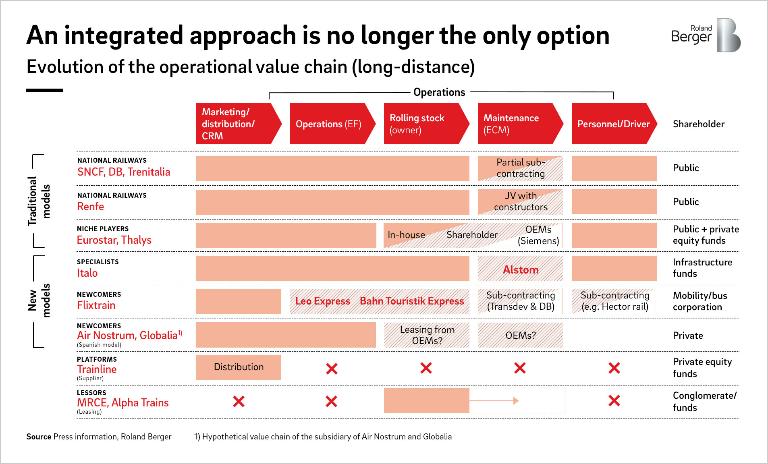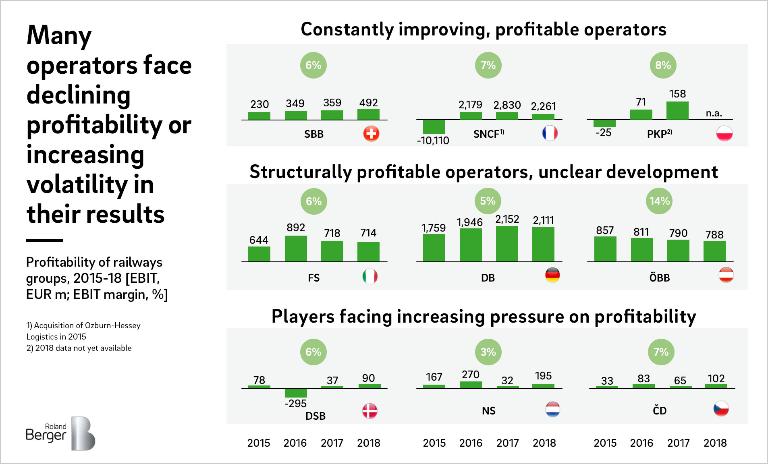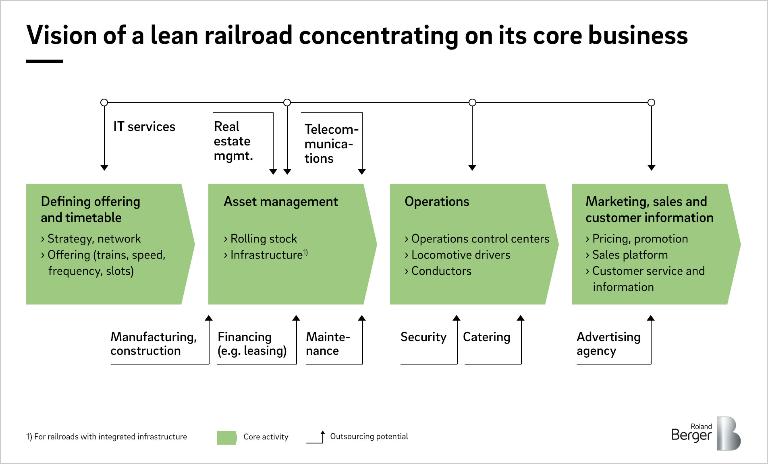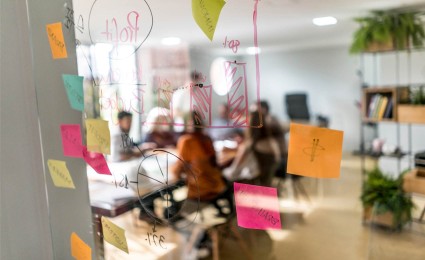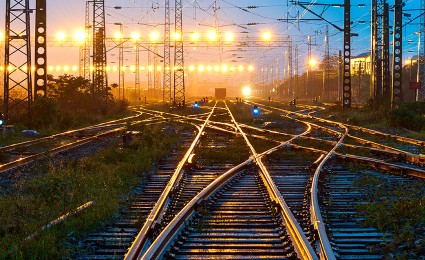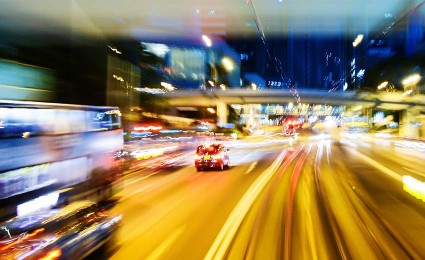

Detoxing the railways: A lean model for Europe's rail transportation system
European railway companies need to define, detox and declutter
European rail operators have their fingers in many pies, from asset management to IT, from catering to consulting. But this lack of focus can prove detrimental to their profitability, their vertical integration counterproductive in today's challenging mobility markets. To master the challenges of an increasingly digital world, we believe that railway companies need to define, detox and declutter. That means mastering the heart of their business – and leaving the rest for partners in their value network.

The core business of a passenger railway system is to provide transportation services to its customers. Yet, many rail operators in Europe seem intent on spreading themselves as thinly as possible, doing everything from building the infrastructure and maintaining rolling stock to running the onboard restaurants and bistros – and often providing consulting services to other transportation and infrastructure companies along the way.
While the attraction of controlling the entire value chain and leveraging your hard-won knowhow is evident, this jack-of-all-trades approach has led many rail operators to lose focus on their core activities. Historically, companies were highly vertically integrated, with large numbers of business units or an extensive network of subsidiaries. Today, however, many of those non-core activities would be better provided by third parties. Fleet financing and maintenance, for example, do not necessarily have to be conducted in-house by the rail company, as the UK rail system shows. IT and communication are crucial for railway operations, but many external providers can manage IT and communication networks at competitive rates. An integrated approach is no longer the only option, and the benefits of pursuing a lean model are significant.
Is now the right time for European railway companies be thinking about scaling back and focusing on their core areas of expertise? The truth is, the current business environment leaves them little option. Market landscapes are changing at unprecedented speed, driven to a large extent by digitization and liberalization. New technologies such as sensors for status monitoring of rolling stock equipment, data hubs for high-speed data transmission, and 3D printing for spare part production are shaking up the market. Railways also face increasing competition – on the one hand from other modes of transportation, and on the other from the subsidiaries of foreign incumbents and private rail operators that are rapidly encroaching on their territory.
Adding to the challenges are growing expectations on the part of customers when it comes to service and prices. Today's consumers expect high-quality products and services, combined with simpler, personalized choices. European railway companies are aware of this and have reacted. They have made major improvements to their communication and transparency, introducing user-friendly websites and mobile applications offering real-time information, ticket purchasing and other functionalities. Yet, many operators still suffer from a low level of customer satisfaction due to their lack of punctuality and high prices compared to other modes of transportation, such as long-distance buses.
Weak growth, strong volatility
How are European rail operators doing at present? Despite increasing demand for mobility, most railway companies are growing at just one to three percent a year in terms of passenger-kilometers or ton-kilometers. Those operators that achieve above-average growth do so by expanding into foreign markets inorganically, as demonstrated by Deutsche Bahn's acquisition of Arriva, Ferrovie dello Stato Italiane's purchase of Netinera, SNCF's part ownership of Keolis, and NS's acquisition of Abellio. A few private railways with clearly focused activities (Italo, Leo Express, RegioJet, one or two private freight operators) are exceptions to the rule.
The main European operators are still managing to achieve reasonable levels of profitability, with an EBIT margin of seven to eight percent. Their continued focus is on offering a modern rail product while at the same time keeping a tight reign on costs. However, many face declining profitability or increasing volatility in their results. Moreover, most are highly dependent on a favorable political environment: Public-sector funding accounts for up to half their total revenues and any political decision regarding energy, for example, can deal a punishing blow to their cost base.
Define, detox, declutter
To master these challenges, European railway operators need to focus on their core activities and achieve outstanding performance here rather than trying to be everything to everyone. They need to make their offering as simple as possible, combining different products and services and acting as a one-stop shop for customers. They must also make their operations as simple as possible, pushing for low costs and short times-to-market.
Roland Berger has developed a framework to help companies get back on track. It can be summed up in three simple words: define, detox, declutter. Define your offering, making your products even more relevant for customers. Detox your operations, shifting activities that you need but cannot master yourself to partners. And declutter your organization, making your structures fit for purpose.
The figure below is a vision – admittedly somewhat provocative – of what a rail company that is truly focused on its core business might look like. The core activities of the organization are defining the offering and timetable, managing assets, running operations and informing customers. In each of these areas the company makes use of external partners, from IT service providers and security firms to advertising agencies and catering companies.
"Historically, rail companies have been highly vertically integrated, with large numbers of business units or an extensive network of subsidiaries. Outsourcing non-core activities facilitates improved quality and customer satisfaction in the core business."
The key for companies, then, is to strive for simplicity. This is not a new idea, but the digital transformation is turning simplicity from a nice-to-have into a hygiene factor. Of course, some groups or conglomerates do more than one thing successfully. In this case, simplicity means having separate businesses that enjoy the autonomy needed to execute their own strategies and operations. In other cases, companies would be well advised to expand the scope of their outsourcing so it covers not just overhead or shared services but also parts of their value proposition. Partnerships thus become a strategic necessity, rather than a last resort. Managing such partnerships – ensuring an effective value network that delivers the best product for the customer – becomes a core success factor.
Detoxing requires a shift in mentality from a traditional "value chain" way of thinking to a "value network" perspective. In the past, companies were often advised to ask themselves the "make or buy" question: Should they offer a particular product or service themselves or should they buy it in from a third party? Today, the question is no longer make or buy, it is master or partner.
Of course, no one solution exists for all rail operators. Each operator has their own individual capabilities and should strive to identify and take advantage of them. In the process, they should also determine which areas they are underperforming in and try to determine who they could partner with here.
Act now: A three-step detox for railway companies
At Roland Berger, we recommend a three-step detox for railway companies. First, review and improve your value proposition. Second, restrict your business to core activities and cleanse yourself of everything else. Third, create a structure that focuses on your core and allows you to adapt without changing the structure each time. This should be a continuous process, not a one-time purgative. After all, the world goes on spinning – and you must spin with it.
Finally, railway operators should remember that there is no time like the present. Value networks are taking shape, strategic alliances are being formed and partnerships solidified. Now is the time to do what you do best and farm out the rest: The opportunities of today may have been snapped up by tomorrow.


